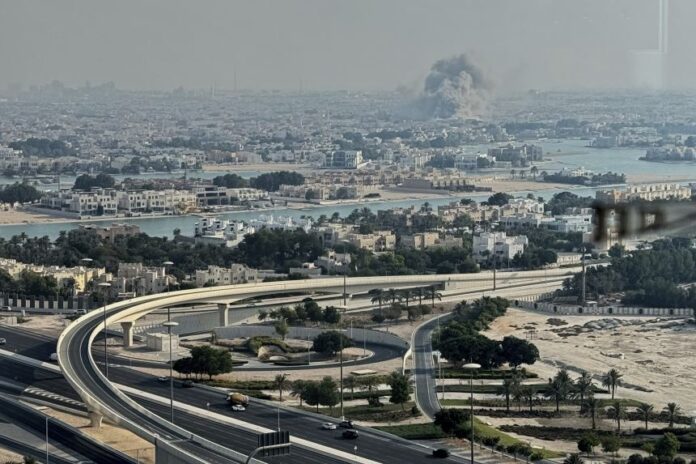On the night of September 9, 2025, Israel did what few believed possible: it launched direct airstrikes on Doha, Qatar, targeting senior Hamas leaders operating openly in the Gulf emirate. The Middle East awoke to more than smoke — it awoke to the collapse of long-standing red lines, and a West divided between strategic silence, clumsy justifications, and fraying alliances. The United Nations Security Council convenes today in emergency session. But the message has already been sent.
A Direct Strike on a “Neutral” Ground
According to Tel Aviv, the strikes were aimed at “senior Hamas command,” long known to operate from Doha under the passive gaze — or tacit approval — of Qatari authorities. But the timing, method, and location of the operation are seismic in implications:
- The Israeli airstrike struck central Doha, reportedly killing six, including one Qatari security officer.
- Hamas confirmed several senior figures survived, but one political aide was critically wounded.
- The complex targeted was a known diplomatic hub, only kilometers from CENTCOM, the U.S. military’s largest base in the region.
The symbolism couldn’t be more loaded: Israel struck under the nose of the Americans, on the soil of a NATO partner, and just days before renewed hostage negotiations brokered by Qatar were set to begin.
Trump and the Fracturing Atlantic Alliance
In an unexpected twist, former President Donald Trump, during a campaign radio interview, publicly distanced himself from Netanyahu’s move:
“Israel doesn’t always act in America’s interest,” he said. “That was Netanyahu’s call — and I’m not sure it was the right one.”
This unusually candid disavowal suggests two things:
- The U.S.-Israel axis is under strain, not just under Biden’s ambiguous leadership, but also in the Trumpist wing of the American right.
- The Israeli government acted unilaterally, either without informing Washington, or in defiance of private objections.
While the Israeli ambassador to the UN defended the strike, calling it “a surgical operation against Hamas, not the Qatari state,” the damage to diplomatic norms is already done.
China and the Global South Respond
The immediate condemnation came not from Washington or Brussels, but Beijing. China’s Foreign Ministry “firmly condemned” what it called a violation of Qatari sovereignty, warning against “unilateral militarism” in the Gulf.
Meanwhile, Algeria and Pakistan triggered an emergency session at the UN Security Council, scheduled for 3 PM New York time, exposing again the fault lines between the West and the Global South on Middle Eastern policy.
Qatar, for its part, vowed to continue mediation in the Gaza war, with Prime Minister Sheikh Mohammed bin Abdulrahman Al Thani stating:
“Mediation is part of our identity. Nothing will stop us from playing that role — not even this aggression.”
This assertion, half defiance, half damage control, underscores Doha’s delicate position: simultaneously host to U.S. military power, sponsor of Islamist diplomacy, and Gulf monarchy seeking regional prestige.
Macron’s Symbolic Gestures
Back in Paris, President Emmanuel Macron tried to seize moral ground by meeting with families of hostages still held in Gaza. Yet the gesture felt hollow — a photographic performance, disconnected from France’s increasing diplomatic irrelevance in the region.
France supports Qatar’s mediation, supports Israel’s right to self-defense, condemns Hamas, and speaks of international law, a strategic quadrilateral of contradictions. No one is listening.
Strategic Assessment: Red Lines Are Gone
This strike is more than a one-off. It signals that Israel no longer recognizes any off-limits geography when it comes to Hamas — not Beirut, not Damascus, and now not Doha. The implications are profound:
- Qatar’s neutrality is over. Hosting CENTCOM and Hamas simultaneously has become untenable.
- U.S. credibility is weakened, regardless of who sits in the Oval Office.
- Arab regimes are cornered — forced to either condemn Israel or appear complicit.
- Iran and Hezbollah may see this as an opportunity to escalate, testing how far Israel is willing to go.
Meanwhile, Western media coverage remains cautious, perhaps unwilling to call out an act that — had it come from Iran or Syria — would’ve been labeled terrorism.
Conclusion: A Point of No Return
September 9, 2025 may be remembered as the night the Middle East’s remaining diplomatic fictions collapsed. Israel struck not just a Hamas cell, but the illusion of neutral ground. The fact that this happened in Qatar, a key Western partner, signals a new doctrine:
Strategic autonomy over Western consensus. Military priority over diplomatic process. National interest over alliance loyalty.
And the silence from Washington? Deafening.



